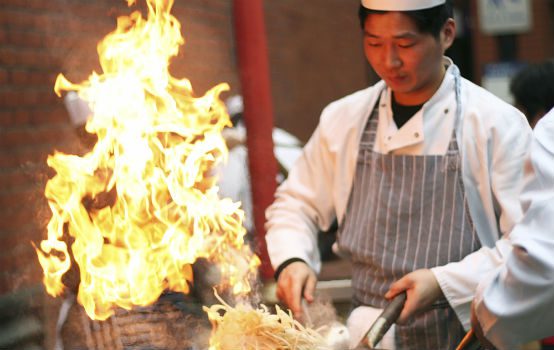The Chinese Buffet That Beat Hurricane Sandy

Perhaps I am the only person for whom a visit to the Chinese buffet is an occasion for reflecting on the nature of work and society. I do not mean that I philosophize to the exclusion of stuffing myself with chicken and broccoli, hibachi noodles, and soft serve ice cream. But I will never forget one surprisingly thoughtful (on my part) buffet dinner five years ago in the fall of 2012.
It was the week after Hurricane Sandy hit New Jersey, and power was still out almost everywhere. I’d been sent home from college, where the backup generators had been destroyed by downed trees, and was staying a couple of nights at a friend’s house. It wasn’t very easy to get food yet, but my friend’s mother had found out that a favorite Chinese buffet of ours was somehow still open. And so we took the 20-minute drive, despite a gas shortage, and forked over our $11 each for dinner.
I was surprised that the place was open at all. We had passed houses with damaged roofs, roads covered in tree debris, and residential streets and strip malls locked up and unlit. In fact, I hadn’t thought much of anything was open except a few gas stations and McDonalds. Yet here was an endless array of sushi, clams on the half shell, fried shrimp, fresh rib-eye steaks for the hibachi grill, and much more, catering to a packed house with no shortages in sight.
While I stood at the grill, where you could pick from a variety of ingredients and have them all cooked in front of you, an old man ahead of me—clearly a regular—whistled and clapped as the chef juggled eggs and knives. Even a couple of feet away, behind a protective glass barrier, I could feel its intense heat.
There is nothing like a disaster to make one appreciate what is otherwise mundane. I thought about that chef, working all day, juggling dozens of eggs, never letting the knife slip, always perfectly cooking a plate that was never quite the same as the last. It was done well enough that you never much thought about the human work—and potential for human error—involved. Yet it was a real flesh and blood man working that grill, hour after hour. Perhaps he was fatigued after a busy day, or perhaps the cornucopia of the restaurant was a relief to him compared to his own home, which probably still lacked power. The waiters are people too, I thought, with lives no less rich than those of us who go to graduate school and work for elite corporations.
This plain old strip-mall Chinese buffet that night seemed a case study in how decent, honest work, so often denigrated or rendered invisible, can overcome a disaster. Of course, the buffet didn’t just serve dinner during hurricanes. But I considered what a logistical feat it was to still bring the delivery trucks in, keep the lights on, prepare dozens of dishes perfectly night after night. There was a pleasant regularity and stability here, not to be disrupted by anything, not requiring government assistance to continue. It also signified more than just sharp business management. Perhaps for that man cheering the hibachi chef, going out to dinner was as comforting as coming home. A friendly, welcoming restaurant can feel almost like a family, but it can only be made so by monotonous and relentless labor.
I felt rather ashamed that any of this was an insight to me, because it can only be an insight to someone who has never worked a manual job. But just as there is no shame in manual labor, there should be no shame in doing “brain” work, so long as we understand our mutual dependence. I am reminded of a political science professor who pointed out that we can sneer all we want at those who are ignorant of politics, yet we are perfectly helpless when our car breaks down. In our world, everybody specializes.
Some of us specialize in politics or auto mechanics; some specialize in writing think pieces. Others specialize in feeding 200 people at a time with sushi and steak during a mass power outage. All are valuable in a large, diverse society—though if we could not sustain them all, I think I would preserve that little Chinese buffet.
Addison Del Mastro is assistant editor for The American Conservative. He tweets @ad_mastro.
Comments